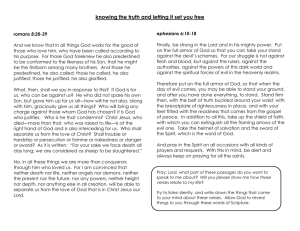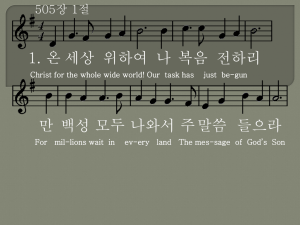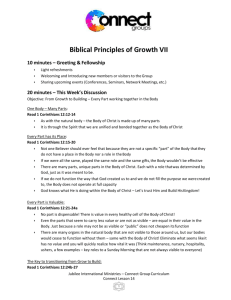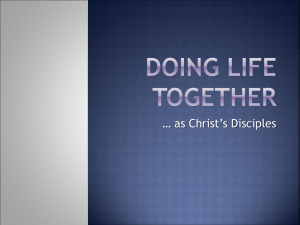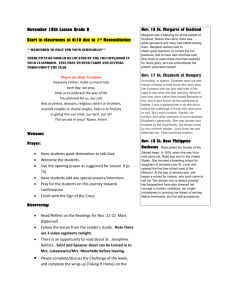All Souls
advertisement
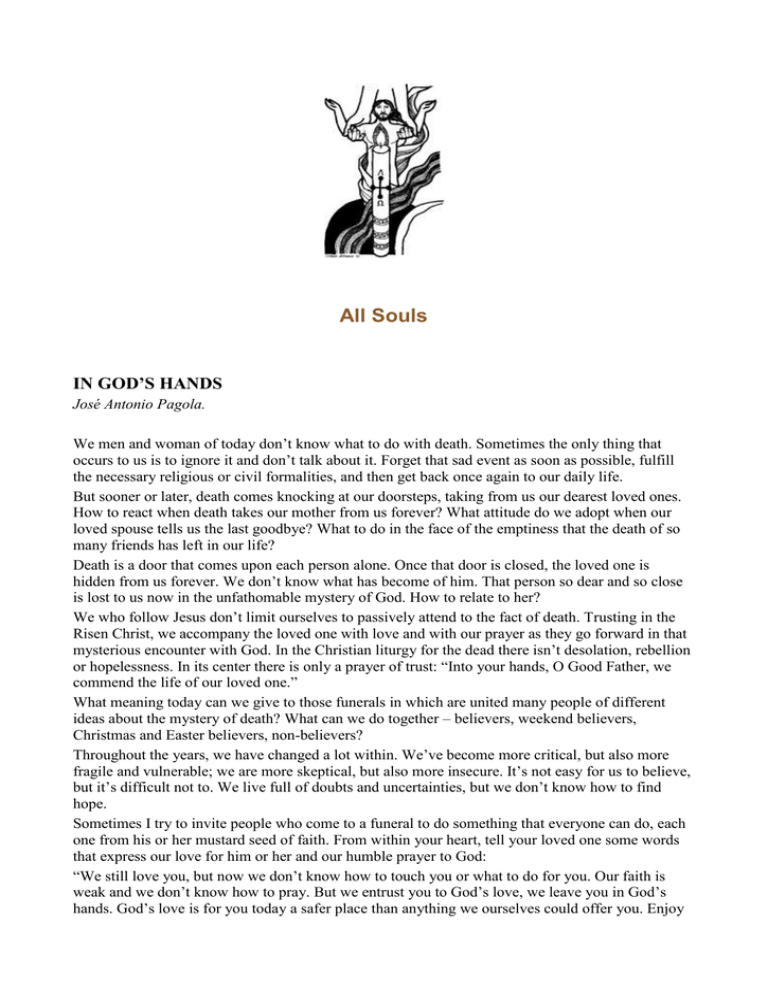
All Souls IN GOD’S HANDS José Antonio Pagola. We men and woman of today don’t know what to do with death. Sometimes the only thing that occurs to us is to ignore it and don’t talk about it. Forget that sad event as soon as possible, fulfill the necessary religious or civil formalities, and then get back once again to our daily life. But sooner or later, death comes knocking at our doorsteps, taking from us our dearest loved ones. How to react when death takes our mother from us forever? What attitude do we adopt when our loved spouse tells us the last goodbye? What to do in the face of the emptiness that the death of so many friends has left in our life? Death is a door that comes upon each person alone. Once that door is closed, the loved one is hidden from us forever. We don’t know what has become of him. That person so dear and so close is lost to us now in the unfathomable mystery of God. How to relate to her? We who follow Jesus don’t limit ourselves to passively attend to the fact of death. Trusting in the Risen Christ, we accompany the loved one with love and with our prayer as they go forward in that mysterious encounter with God. In the Christian liturgy for the dead there isn’t desolation, rebellion or hopelessness. In its center there is only a prayer of trust: “Into your hands, O Good Father, we commend the life of our loved one.” What meaning today can we give to those funerals in which are united many people of different ideas about the mystery of death? What can we do together – believers, weekend believers, Christmas and Easter believers, non-believers? Throughout the years, we have changed a lot within. We’ve become more critical, but also more fragile and vulnerable; we are more skeptical, but also more insecure. It’s not easy for us to believe, but it’s difficult not to. We live full of doubts and uncertainties, but we don’t know how to find hope. Sometimes I try to invite people who come to a funeral to do something that everyone can do, each one from his or her mustard seed of faith. From within your heart, tell your loved one some words that express our love for him or her and our humble prayer to God: “We still love you, but now we don’t know how to touch you or what to do for you. Our faith is weak and we don’t know how to pray. But we entrust you to God’s love, we leave you in God’s hands. God’s love is for you today a safer place than anything we ourselves could offer you. Enjoy the fullness of life. God loves you as we didn’t know how to love you. One day we’ll see you again. Thirty-first Sunday in Ordinary Time - Cycle A - Matthew 23:1-12 The boss was in his new office. An employee walked in. The boss picked up the phone and started an imaginary conversation flattering himself. He signaled the worker he'd be with him shortly. The employee said, "Take your time, boss. I'm here to hook up your phone." "A proud heart," wrote Ben Franklin, "is like a crooked fence. All the paint in the world won't straighten it." The problem of pride was as bothersome to the early Church as it is to ours. Mark and Luke touch upon pride as well as today's Matthew. No century corners the market on pride. Can anyone even remotely imagine a proud Christ? Yet, He had much to be proud about. What disciple does Jesus seek? A monk was sent to an abbey as abbot. He arrived at the abbey. From his dress, the monks judged him inferior. They sent him to their kitchen. Their new abbot spent weeks scouring pots and shelling beans. The bishop arrived. When he could not find the abbot, he went on a search. He found him in the kitchen preparing supper. He presented him to the monks in chapel. They had received a lifetime lesson in humility. The abbot is the man whom the Teacher wants. (William Barclay) The proud, we are told, pray on Sunday and PREY on those about them on Monday. Rather, pray with God on Sunday and walk with Him on Monday. The abbot reminds us when we think we are humble, we are not. Many of us even have a nasty habit of being proud of our humility. We become legends in our minds. We go to church to find out what our neighbors should do to lead better lives. He that is proud, said Shakespeare, eats himself up. Pride, says the Bible, goeth before the fall. In Lewis Carroll's "Alice in Wonderland," Alice found a mushroom. When she ate one side of the mushroom, she found herself getting smaller. When she ate the other side, she got taller. Of the two situations, Alice decided smaller was better. For, as she was reduced in size, all things and people about her looked more wonderful. Less, she discovered, can be more. Small can be beautiful. Walt Whitman ate the correct side of the mushroom, for he wrote, "As for me, I know nothing else but miracles." We are forever circling that same mushroom. If we allow ourselves the portion that makes us larger, everything else about us will lack wonder. We will become puffed up with our worth. Critics will put us down as studies in pomposity. We will develop in ourselves the very faults which we detest in others. The proud, says the savant, detest pride in others. A man was awarded a medal for his humility. Shortly he was stripped of it. He had begun to wear it proudly. Many of us have much in common with him. Two ambassadors walked on Paris' Champs Elysees. They were grieved. Though the Parisians had greeted them warmly, none had addressed them with their title, "Your Excellency." If proud, one becomes the character whom Peter Ustinov addresses in his play as "Your Altitude." We become like those who ask, "What will the world do without me when I'm gone?" Only those who permit themselves to grow smaller and smaller will be able to see "the world in a grain of sand and heaven in a wild flower." Not only will they bring themselves joy but also they will share that joy with others. They will be God's ambassadors. They will give pleasure to the Christ. They will become the children which the Nazarene asked us to be. They will rush into the Kingdom laughing and singing "When the Saints Come Marching In." A US senator attends a weekly prayer group. At its end, while other participants rush to their jobs, the senator stays to stack chairs and clean up. And he is the highest ranking person there. Looking for a role model? But do not put off this thousand mile journey! Lewis Carroll must have had each of us in mind when he wrote in his other classic "Through the Looking-Glass": "It takes all the running you can do to stay in one place. If you want to get anywhere, you have to run twice as fast." A US president was working an old age home for votes while running for a second term. He said to an old man, "Do you know me?" The fellow said, "No, but if you ask the nurse, she'll tell you." No one, history tells us, has ever choked to death from swallowing his own pride. Can those, who really know themselves, afford to be proud? The Commemoration of the Faithful Departed (All Souls Day): Expressing His Love It is only a few months since your husband or wife died, or perhaps your parents who lived with you, or maybe it was your child. You get up from the sofa in the living room to go to the kitchen, and for a split second you think you see him or her. Then you remember, "No, Mom passed away two months ago.” Or you go to Grandpa and Grandma’s house. Only Grandma is not there; she passed away recently. But in an unguarded moment, in the blink of an eye, with a quick glance, you think you see her there. These are common occurrences. Certain places or events can trigger our memory in such a powerful way that the person we remember seems present. Now, some people will say, "Mom’s gone.” or "She’s just a memory, but she isn’t here any more,” and do their best to move on with life. We Christians do more than that, though. Much more. For us Christians the everyday event of sensing the presence of our departed loved ones reminds us of a wonderful reality: our loved ones still live. The flashback to their presence in our lives often leads us to say a prayer for them. Perhaps we might say, "May she rest in peace, united to the Lord forever in the peace of Christ.” Why do we pray for our deceased loved ones? Why do we have this celebration today, the Commemoration of All Souls? Why do we dedicate the month of November to praying for the dead? Why do we have funeral Masses? We do all these things because we believe in the power of prayer. We believe that our continual entreaty to God to bring our loved ones to peace will prepare them to bear the fullness of His Love in heaven. We pray because we believe in love. We believe that true love, the love that flows from God and returns to Him, true love remains forever. We sincerely loved the members of our family, our friends and all who have died. And we still love them. This love which is looking for nothing other than to express itself is sacrificial love. It is loving as Jesus loved. We are not expecting anything in return. We just want to express our love others. We do this through prayer. And God hears our prayers and sees the love motivated by those who have died. Some of these loved ones are fully united to Him now. They are the saints, be they canonized by the Church, babies and little children, or older children, Teens and adults all who died with lives so pure, so sincere, that they are ready to endure the blaze of His Love. Some of our loved ones are not ready to enter into His Presence. The results of their sins is still affecting them. Just like an arm broken many years ago still hurts when the weather changes, the deceased who is forgiven his or her sins still suffers the result of the sin. But God’s love is motivated by the love this person inspired in others, seen in their constant prayer. These prayers lead Him to heal the results of sin, or as we say in the terminology of the Church, to free them from Purgatory. This was presented beautifully and succinctly by Dante Alighieri in the second book of the Divine Comedy, The Purgatorio. There he presents the souls in purgatory as holding themselves back from climbing the mountain of God until they are able to accept the fulness of His Love. They are dependent on the prayers of their loved ones still on earth to prepare them to receive the fire of God’s love. The power of prayer is far greater, infinitely greater than we could ever imagine. Often when we pray we call on the strength of the Almighty One to perform an action beyond our capabilities, but not beyond His. Today we pray that the Lord heals the wounds of all who are not yet ready to enter into the fulness of His presence. May they be healed. May any part of their lives that have been closed to Love be completely open to the Presence of God. So we pray today for our deceased parents, spouses, children, relatives, and friends. We know that they were good people. But we also know that they were people. We want them to be capable of receiving the full blast of God’s love; so we pray for them. We celebrate funeral Masses, for that is the prayer of Jesus on the Cross for the deceased, the greatest prayer we could offer. We have additional Masses said for our loved ones throughout the year. We remember them in our daily prayers. And we pray for them particularly on today, All Souls Day, and throughout the month of November. We are all united in the Community of the Church. We are united to the saints in their triumph. We are united with the souls in purgatory in their preparation for triumph. And the saints in heaven and the souls in purgatory are united with us in our efforts to make Christ a reality in our world. "I will reject no one who comes to me,” the Lord said in our gospel for today, John 6:37 We trust in the God who loves us to care for us and our loved ones in life and in death. And so we pray, "May the souls of the faithful departed through the mercy of God rest in peace.” All Souls Message: Prayer holds together our lives, our families, our parish, our world. We depend on the solidarity of prayer. Last week we concluded a homily series titled "Trust no Matter What." The final example of trust was a young Jewish woman (Edith Stein) converted to Christ by reading the Autobiography of St. Teresa of Avila. I'd like to use St. Teresa to make a transition to our November series on Solidarity. In one sentence St. Teresa sums up what I was trying to say about trust: "Trust God," she says, "that you are exactly where you are meant to be." Let me repeat: "Trust God that you are exactly where you are meant to be." By whatever strange path you have come to this place, God has put you right here, right now - and he has a plan for your. His plan involves solidarity - joining yourself to others. That is our theme for November - solidarity. November begins with two celebrations of solidarity: All Saints Day (Nov 1) and All Souls Day (Nov 2). These celebrations show that in God we have solidarity not only with believers here on earth, but also with saints in heaven and with our faithful departed loved ones. St. Teresa speaks about our union with the saints in heaven. She explains it this way: In praying the Our Father we say, "thy kingdom come." A king, she say, does not come alone. He has his knights, ladies and court with him. Just so, when God comes he brings his heavenly court with him. In God we have solidarity with the saints - those united with him here on earth as well as those already in heaven. They pray for us. In the All Saints Day reading John describes that enormous throng. We have solidarity with them and also with those who died in his grace, but are sill on the way to complete union. We pray for them. Let me use my own parents as an example. They died with the sacraments and I feel confident they are with God, but they might still be experiencing some final purification. So I continue to pray for them and remember them at Mass. Christians have done this from earliest times - as did the Jewish people in the centuries before Christ (see 2 Maccabees 12:38-46). We pray for our Faithful Departed loved ones. They are part of our solidarity of prayer. Now, let me try to explain why we need this solidarity of prayer. There was a philosopher named Friedrich Nietzsche who said that the driving force of history is resentment.* One group harms another and they harm back. So resentment grows and grows. When you look at our world today it seems like we are pulling apart and destined to destroy each other. I will speak more about solidarity in the coming Sundays. Today as your pastor I invite you to pray for and with your fellow parishioners - especially our youth. I encourage you to sign a card indicating your prayer commitment. We have a particular card for youth and children. In light of all that is happening in our world, especially the shootings at Marysville High School, it is vitally important that we make this commitment to prayer for each other and for our youth. I would like to conclude with a prayer by St. Teresa. They call it her "bookmark." She wrote it on a scrap of paper and read it every day. She used it to mark her place in whatever book she was reading. I have printed it in the bulletin in both English and the original Spanish. I invite you to close your eyes and to pray it with me as I recite it: Let nothing disturb you. Let nothing frighten you. All things are passing, but God does not change. Patience obtains all. Those who have God lack nothing. God alone is enough. Amen. Sunday, November 2, 2014 Lectionary: 668; John 6: 37-40 The Sunday celebration of the Eucharist is the ultimate commemoration of the Lord's resurrection, and of our participation in it. For this reason the Church rarely cedes this occasion to focus on other saints, should their feast days happen to fall on a Sunday. There are a few exceptions: the feast of Saint Peter and Paul on June 29th comes to mind, yet even there it is due to those great saints' particularly close association with Christ and the proclamation of his death and resurrection that the Church "sets aside” the regular Sunday mass to honor them. Next week, too, we celebrate the Dedication of the Church of St. John Lateran on a Sunday, though this is owing to the original dedication of that great Roman basilica in the time of Constantine as the church of the Holy Savior—Christ himself. Today therefore is unusual in that the celebration of the Sunday Eucharist focuses on the mystery of Christ's resurrection through a very special lens indeed: on this All Souls' Day we remember the dead. Not the saints—that was yesterday—but the dead. The Church's commemoration of All Souls' Day has been shaped over the centuries by words and symbols which help us to face the pain and difficulty of an encounter with death with great hope. The readings today play a beautiful role in this process, presenting to us some inspiring words to strengthen us when we are troubled by the thought of death, and to give us a sense of peace and even joy. The Old Testament passage from the book of Wisdom reminds us that ultimately the souls of all the departed "are in the hands of God”, and that there is nowhere we should rather they be. These words can be hard to accept at first, because we naturally like to think that our loved one is "in heaven”. If we are honest, however, we realize that these words allow God the freedom to do what only God can do: to heal, to teach, and to judge in a manner that is characterized by perfect justice and perfect mercy at the same time. Heaven on God's terms, not ours. Next, St. Paul reminds us in the letter to the Romans that upon the death of a loved one we ought to call to mind and take comfort in their baptism, remembering that as surely as that loved one has now shared with Jesus in death (symbolized by immersion into the water of the baptismal font), he or she now abides in the hope of sharing with Jesus in his new and eternal life. John's gospel has the final word on All Souls' Day, speaking to us as it does about God's will to bring all his children to salvation through Christ. Jesus himself confirms not only the Father's will but announces his own desire to see the will of the Father brought to completion: "I will not reject anyone who comes to me, because I came down from heaven not to do my own will but the will of the one who sent me” (John 6:37-38). This Sunday as we commemorate the departed faithful let us see it as an opportunity to grow in trust in the Lord, recalling that our hope for the resurrection from the dead of a loved one comes not through their own merit or through our desires for them but through the mystery of Christ who experienced death himself in order that we all might have new and eternal life in him who said: "This is the will of my Father, that everyone who sees the Son and believes in him may have eternal life, and I shall raise him on the last day” (John 6:40). Father Edward Mazich, O.S.B. Meeting Christ in the Liturgy All Souls Ch 1, v 14 - Ch 2, v 2. v 8-10; Psalm 131; 1 Thes Ch 2, v 7-9. v 13; Matthew Ch 23, v 1-12 Brothers and Sisters in Christ, "Call no one on earth your father. Call no one on earth your teacher." Our Lord is the Truth incarnate, and uses many means to impart the truth. Only by a proper understanding of his words can we properly follow his teaching. Is our Lord forbidding us to use the name "father" to describe our parents or godparents? Should we no longer call our "teachers" by that name? In another place in the Gospel, our Lord says, "Only one is good, our heavenly Father." Did he mean that he himself was not good? Of course not. Our Lord uses a style of teaching which grabs our attention, and for that reason often is not what it at first appears to be. The point that our Lord impresses upon us here is that all fatherhood comes from God, and all fatherhood should be referred back to God and lived in accord with the goodness and love of God. St. Paul himself claimed the title "father". We read in 1 Corinthians, chapter 4, verse 14, "I...write this to...you as my beloved children. For though you have countless guides in Christ, you do not have many fathers. For I became your father in Christ Jesus through the gospel." Was St. Paul in violation of the Gospel? Not at all. He understood our Lord's teaching and applied it properly in his life, as we ourselves must do. He was "father" precisely in reference to God our heavenly father, because he brought the life of God the Father to those to whom he preached, whom he baptized and adopted into the family of God. And so also today with our priests The priesthood is a precious gift beyond our understanding. Mere men are able, through the gift of ordination, to share in the one true priesthood of Jesus Christ, the High Priest. "In the ecclesial service of the ordained minister, it is Christ himself who is present to his Church as Head of his Body, Shepherd of his flock, high priest of the redemptive sacrifice, Teacher of Truth." (CCC 1548) Beginning with the Apostles, the first priests created by our Lord on Holy Thursday, and handed down through the laying on of hands and the invocation of the Holy Spirit, down to our own day, every man who shares in that gift brings the life and love of Christ to the whole world. This is a scandal-ridden age, and the Church always suffers in her members from the effects of scandal. "Scandals will come, but woe to those by whom they come." But we must always hold fast to the truth. And the truth about the priesthood is that the Fatherhood of God, perfectly revealed to us in Jesus Christ the Priest, is ours through the men we call "Father". We are children of God through the preaching of the truth by our deacons and priests and the grace of the sacramental life they dispense. In this age of error and falsehood we are desperately in need of the truth of Christ the Teacher through the word and counsel of our priest-fathers. We are children of God through baptism at the hands of our priests. We shed the weight and shame of sin, by the words of forgiveness, "Ego te absolvo", from Christ through our priests. In this manner we become again the beloved children of God we were destined to be from the beginning of time. We receive the very Body and Blood of Christ through the hands of our priests in the Holy Sacrifice of the Mass. There are some today who wish to pretend that lay members of Christ's faithful people can substitute for the priest as the one who offers the Sacrifice and confects the Eucharist. This is not so. The Second Vatican Council teaches that all the baptized share in the one priesthood of Christ but that the ministerial priesthood, in service to all the baptized, differs in kind and not just in degree from the common priesthood of the faithful. "...the priest, by virtue of the sacrament of Holy Orders, acts in persona Christi Capitis." (CCC 1548) The ordained priest is ontologically changed, in the core of his being, and is "a priest forever". He teaches, preaches, offers the Sacrifice, baptizes "in persona Christi", in the very person of Jesus Christ. Lay members of the faithful can never, by power of their baptism, make Christ truly present on our altars. Let us honor and pray for all men who share, always unworthily, in the one priesthood of Christ. Let us shun detraction and calumny against priests, as we should concerning all our brothers and sisters. And let us proclaim and teach the sublime dignity and beauty of the priesthood, through which we always meet, know and love our Lord Jesus Christ in the Sacramental life This week, take a moment to thank your priest for "being a priest". Let's pray for each other until, again next week, we "meet Christ in the liturgy",

